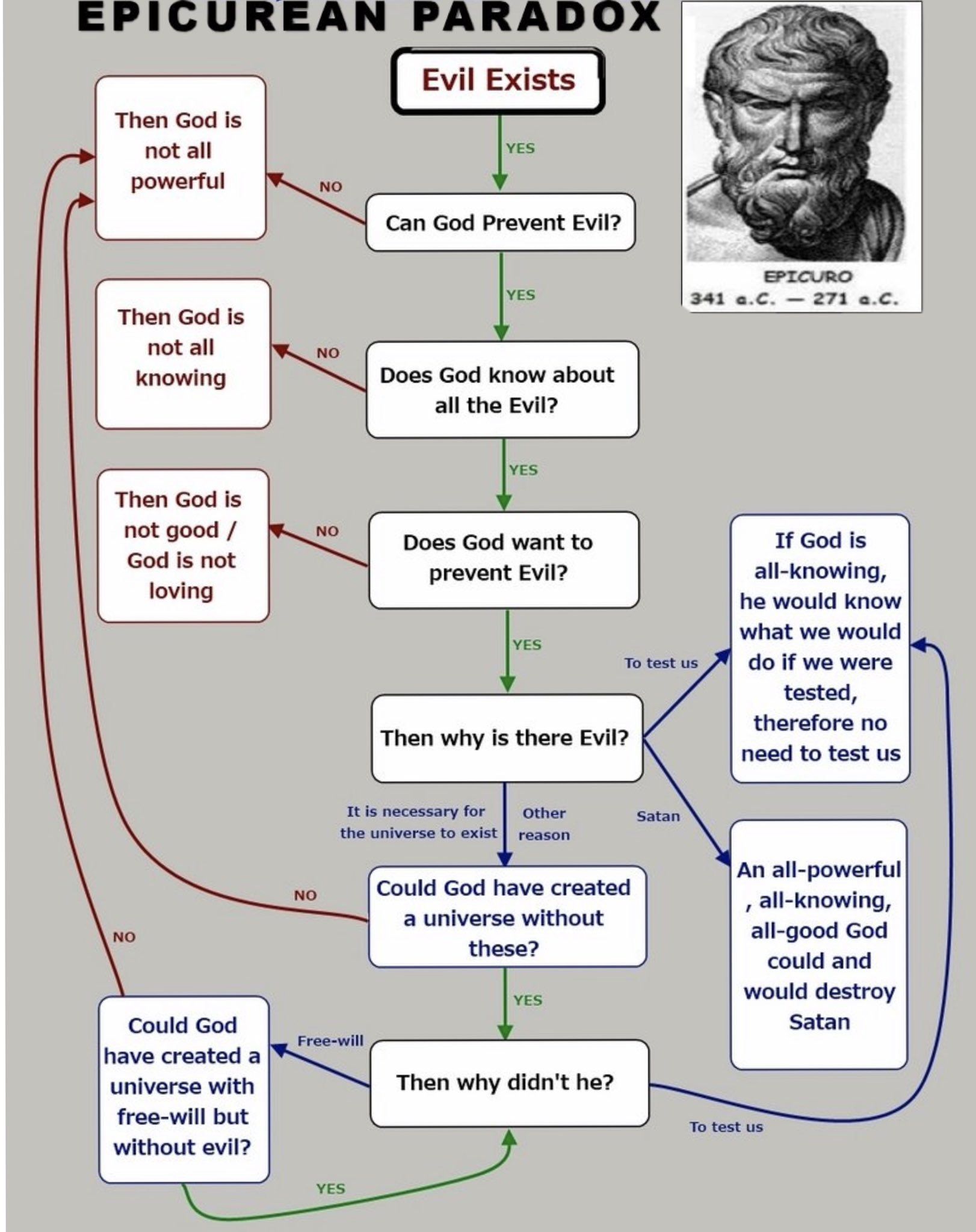why is this nsfw i have one hanging up in my office cubis
Atheist
Atheists, skeptics, humanists, universalists, and agnostics.
In what sort of workplace is this not safe?
My lemmy app says the OP is from the lemmynsfw instance, maybe that has to do with it?
Any where you're supposed to work instead of doomscroll and browse for memes..?
There is a somewhat obvious seeming out to this that a religious person could take I think: what if they were to simply look at the start to it and say "Evil doesnt exist, everything we think is evil actually isnt for -insert some reason here that presumably whatever god they follow understands but humans cant/dont-" It wouldnt work for truly dualistic religions since having an evil deity as well as a good one requires evil obviously, and it does make "good" a fair bit less meaningful, but still. Granted, Im not sure if any actually do this.
That'd work if for instance there wasn't the ten commandments and a ton of "this is evil don't do it" in any holy book out there.
It's called [Philosophical/Religious/Metaphisical/Leibnizian] Optimism, was seriously argued by Leibniz, and was the satirical subject of Voltaire's Candide, and definitely persists as a lay Christian belief.
It'd need some serious mental gymnastics to consider, say, raping babies not evil, though.
As for dualistic religions, they fail either the "can god prevent evil" or the "does god want to prevent evil" checks, therefore their gods either aren't omnipotent or are themselves evil.
I've never liked these sorts of arguments because they appear to presuppose a humanized God, who follows a similar thought process which is expected to be understandable to us. It also asserts before any arguments that evil must definitely be an immutable force in the world, while much of biblical teachings suggest that evil is very much mutable in many ways.
they appear to presuppose a humanized God, who follows a similar thought process which is expected to be understandable to us
The core of the argument arises from the hellenistic idea of god being a perfect being. Perfection requires omnipotence, omniscience omnibenevolence (and some other characteristics that we can ignore right now). Philosophers could demonstrate that these ideas are in contradiction of what we see in our world. All of this was well known before Christianity developed which is why they bear the name of the greek philosopher Epicurus.
Christianity arose in Israel and the hellenistic near east in both philosophical traditions. For example Paul who was of Jewish ancestry, grew up in a Roman city and spoke Greek, Aramaic and Hebrew. He had both a formal Jewish and Greek education and was clearly understood Stoic philosophy. Later, the church fathers shaped christian doctrine with their knowledge of philosophy, in particular St Augustine introduced many neo-Platonist ideas in which the idea of god is 'perfect'.
The idea of perfection immediately leads to the omni-powers discussed above. It also leads god to existing outside time (for if you are in time, you change. If you change you must either become better (i.e. you were not perfect) or worse (i.e. you are now not perfect)). It also allows god to be the prime mover or original cause of the universe recapitulating well rehearsed Greek philosophy of the previous centuries.
Again, all these arguments are pure logic exploring what perfect knowledge, perfect power and perfect goodness mean, and comparing this to the state of the world and how the world was brought into being. They don't require anything of god except to be perfect.
Well, any sort of discussion on the subject needs a god who follows thought processes which is expected to be understandable to us, otherwise there is nothing to discuss. The theist in the scenario can proclaim fideism, and that is an acceptable stance to take, but it does also prevent any attempts at theist rationalisations besides the actual fideism, and hence also any need for people to take heed for the fideists religious considerations.
It also asserts before any arguments that evil must definitely be an immutable force in the world
No, I don't see it doing anything of the sort.
